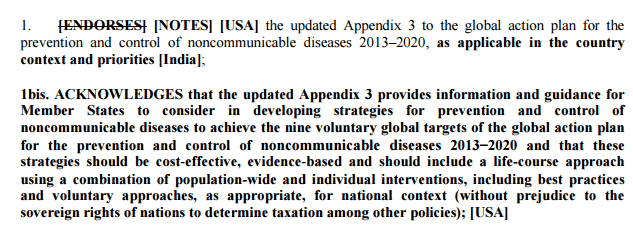By Priit Tohver, Marie Hauerslev and Skander Essafi, International Federation of Medical Students’ Associations
The International Federation of Medical Students’ Associations (IFMSA) is greatly concerned by the fact that noncommunicable diseases (NCDs) are the biggest killers worldwide, causing 70% of all deaths, of which many are premature. NCDs are often referred to as a slow motion public health disaster, implying that current actions and policies are insufficient and not appropriately addressing the issue. One of the major reasons is inadequate financing. Indeed, lamentations about the underfunding of NCDs and repeating budget cuts in the recently approved WHO programme budget were a common feature in Member State interventions at the recently concluded World Health Assembly.
At the 70th World Health Assembly, NCDs were at the centre of attention. The seemingly bottomless agenda item included public health milestones such as the updated version of the WHO action plan appendix 3 on evidence-based and cost-effective policies for tackling NCDs, the report on childhood obesity and the resolution on cancer. Furthermore, there were 26 WHA side-events with a direct link to NCDs, to celebrate progress made as well as accelerating action leading up to the United Nations High Level Meeting on NCDs in 2018.
It was all the more surprising therefore, that some Member States had such difficulty supporting the NCD-related documents listed. Particular political disagreements were related to the WHO appendix on evidence-based policies, which to quote the document itself, was merely “a menu of policy options and cost-effective interventions to assist Member States in implementing, as appropriate for national context (without prejudice to the sovereign rights of nations to determine taxation among other policies)” actions to tackle NCDs. The updated Appendix 3 contains a number of policy measures such as a tax on sugar sweetened beverages and marketing limits for harmful substances, with the most recent evidence to back them up.
Regardless of their non-binding and evidence-based nature, certain Member States opposed and questioned the endorsement of the Appendix. Concerns were raised directly at the mentioning of a sugary drink tax, among other things, by both the US and Italy, who claimed the tax had only “limited evidence” to back it. Other Member States responded by including a number of caveats within the resolution text to ensure that such policy measures could only be viewed as mere recommendations to be considered, yet this did not move either delegation closer to “endorsing” Appendix 3. As a last-minute solution, it was agreed that the 192 Member States would move on with the endorsement of Appendix 3, with Italy and the US alone disassociating themselves from the Consensus. Following the adoption of the Consensus, the US reiterated their concerns about Appendix 3, stating, among other things, that it failed to “reflect the fact that all foods can be part of an overall healthy diet.” Italy added that the prevention and control of NCDs must be pursued based on a voluntary approach taking into account “the educational level of the population”. Such reactions left quite a negative note on how to move forward with this document. Indeed, it was the first time in recent history that consensus could only be achieved through disassociation at the World Health Assembly.
Nevertheless, IFMSA remains hopeful to see accelerated action on policy implementation, resource allocation and involvement of all stakeholders, including youth at all levels of society. In the lead-up to the World Health Assembly, IFMSA organized a 4-day event to prepare 50 delegates by trainings in global health diplomacy skills and increasing understanding of key global health issues, non-communicable diseases naturally being one of them. A group of 12 dedicated delegates discussed NCDs in depth, created a policy brief on Ending Childhood Obesity, e.g. supporting the sugar tax, and advocated for IFMSA’s stance during the WHA 70.


